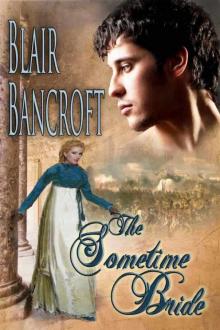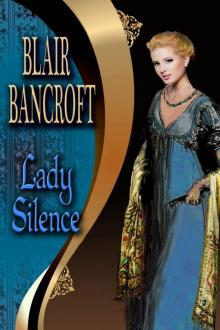- Home
- Blair Bancroft
Airborne - The Hanover Restoration Page 3
Airborne - The Hanover Restoration Read online
Page 3
My eyes misted. From Mrs. Biddle’s attitude, I’d expected a room in the attic with the maids. I drew myself up to my full five feet two inches. “This will do nicely,” I said.
“Tillie!” Mrs. Biddle called. A maid popped through a side door I had not noticed.
“Tillie will do for you while you are here,” the housekeeper said, as if I were a guest for nothing more than a week’s visit in the country. “At the moment she is unpacking your trunk. I believe you will find her satisfactory.” Tillie, a girl of not more than seventeen, bobbed a curtsey.
We had lived simply in London, my needs not demanding enough to warrant a full-time maid. One of the housemaids fitted my corset each morning, helped me off with it at night, trundled my clothes to and from the laundry, and assisted when I had to dress for a party. Otherwise, I did for myself. What on earth would I find for Tillie to do?
But I smiled and welcomed her. At least the girl presented a friendly face.
With a curtsey that might have lowered her head a half-inch, Evangeline Biddle departed, leaving me with my new maid. “Would you like to see, Miss?” she said, glancing behind her. “Make sure I’m doing it right?” Not wanting to hurt her feelings, I dragged my weary feet to the room next door.
Merciful heavens, I had a dressing room! Tillie moved past my gaping trunk and the row of dresses she had already hung in the wardrobe along the wall, continuing through yet another door. I followed . . .and didn’t bother to hide my gasp of surprise. I was in a bathing chamber. I’d never actually seen one, but I knew they existed. Papa had always talked about constructing one, but inventions that brought in money rather than paying it out were always more important.
In yet another of Stonegrave Abbey’s mechanical marvels, pipes, controlled by round metal knobs, ran to a great copper tub. I peered in. There was a drain hole, with a stopper of some material I didn’t recognize. The floor around the tub was tiled and towels, much fatter and fluffier than the linen I was accustomed to, hung on metal rods along the wall.
“His lordship’s right smart,” Tillie boasted. “Thinks up all kinds of strange things, he does.”
“Indeed,” I murmured, my head threatening to go into that whirl I felt when I first saw the Mono. “Tell me, Tillie, do you have any idea when I will meet Lady Rochefort? I forgot to ask Mrs. Biddle.”
“There’s no Lady Rochefort, Miss. She’s been Lady Thistlewaite for many a year now.”
I’ve been told my comprehension is superior, but Tillie’s response was the final straw, sending my brain spinning. It simply didn’t make sense. “Lady Rochefort is now Lady Thistlewaite?” I echoed blankly.
“Yes, Miss.” Clearly, Tillie thought me more than a trifle slow.
I would re-phrase. “I was referring to Lord Rochefort’s wife. I should pay her my respects.”
Tillie’s face brightened to near laughter. “Lor’, Miss, he ain’t got no wife. ’Tis his mum as is Lady Thistlewaite.”
Oh. “But Lady Thistlewaite lives here at the Abbey,” I persisted.
“‘As little as possible’—least that’s what his lordship always says—but I heard as she’s comin’ fer a visit any day now. We’ve been readying rooms t’past few days.”
“But she is not here now?”
“No, Miss.”
“Thank you, Tillie. I appreciate your help.” I mouthed the expected phrases automatically before returning to my room and sitting down with a thump on the blue- and green- brocaded chaise. My guardian was a single gentleman with no resident female of sufficient standing in society to act as my chaperone. I suppose he thought it didn’t matter. The nobles on my family tree were at least two generations removed. I was merely the daughter of an inventor. Perhaps the thought that I valued my reputation never crossed Lord Rochefort’s mind.
Or . . . was that why Lady Thistlewaite was expected? Possibly my guardian wasn’t so careless, after all. But tonight . . . would I be dining with him alone?
And then I remembered the fire.
Chapter 3
A scant two hours later, Tillie escorted me down a gracefully curved staircase, through two finely appointed reception rooms into a drawing room as grand as any in Mayfair. More so, in fact, as it appeared the furnishings, in last century’s style, had been recently refurbished, the fabrics, from sofas to draperies, scarce off the upholsterer’s bolts. If my guardian had no wife, who had initiated this attempt to bring the Abbey into the mid-nineteenth century? His mama, perhaps, for gentlemen tended to let fine fabrics turn to dust before they noticed.
Adding to the drawing room’s elegance, ancestral portraits in a variety of poses vied with old masters. I recognized a Reynolds and a Gainsborough, interspersed with Canaletto, Vermeer . . . and was that a Rembrandt? And not a blank space in sight. Excellent. It appeared Lord Rochefort was not reduced to selling off his masterpieces and therefore would not be tempted to dip into my inheritance.
A slight movement, or perhaps just a feeling, and I realized I was not alone. At the far end of the room, Julian, Lord Rochefort, swung ’round from his hands-behind-his-back contemplation of the view outside. “Again, my apologies, Miss Galsworthy,” he said, moving toward me. “I hope you are not starving. Due to our little contretemps in the stables, I was forced to order dinner set back an hour. I had hoped to talk with you before dining, but I fear Mrs. H will have our heads if we do not go in immediately.”
I heard his words, but they went flying past my consciousness like a swarm of gnats, making little impression. “You’re hurt!”
My guardian, though impeccably garbed in black frock coat, slim black trousers, a gray brocade waistcoat interwoven with silver threads, and a neat black bow tied in the latest fashion, sported bandages on both hands and a red patch on his forehead that appeared to be a burn.
“It has been an adventurous afternoon,” he returned with a nonchalance that left me speechless. “Shall we go in?” He offered me his arm.
As we walked at a stately pace toward the dining room, I managed to gather my wits, though for a moment I feared they’d been assaulted once too often in the course of this remarkable day. The Galsworthy curiosity, however, I realized with some satisfaction, could survive almost anything. “I take it the fire was serious, my lord,” I said as a footman pulled out a chair for me at one end of a table that could seat at least a dozen. “I should very much like to know what happened.”
I gulped as the room’s atmosphere crackled into stormy. My guardian, who had appeared perfectly affable so far, suddenly transformed into Zeus, poised to hurl lightning bolts from both hands. A sight more frightening than the monster with a metal cylinder for a head.
“Re-arrange the seating immediately,” he roared. “Miss Galsworthy will sit on my right.”
Ah! His anger was not with me, but with Mrs. Biddle. Yet his fury seemed excessive for such a minor error. After all, seating a pair of diners at opposite ends of the table was traditional.
But if Rochefort already knew his housekeeper did not welcome my intrusion into her kingdom . . .? Ah yes, that would explain it.
The change of place setting was quickly made, and I found myself dining at my guardian’s right hand. He no longer appeared angry, merely thoughtful. As the soup—a light broth with tiny meatballs and currants—was served, Rochefort declared, “I offer a bargain, Miss Galsworthy. After dinner, I will tell you about the fire if, during dinner, you will tell me about yourself.”
I suspected he was putting me off, hoping I would forget his promise. But I could scarcely blame him for not wanting to talk about what had obviously been a trying experience.
“I fear I have led a very quiet life for someone who was born and raised in London,” I admitted after tasting the soup and finding it delicious. “Our lives centered around Papa’s workshop in the house and our much larger workshop in a warehouse near the railway tracks, where his models became reality.” I described our days of constant creativity, broken only by occasional drives in the park, a Sunday jaunt
on the Regency canal, visits to museums and art collections, and journeys to view the inventions of others.
The baron’s shrewd eyes flicked over me, examining, questioning. One dark curl dangled next to the burn patch on his forehead, emphasizing its angry redness. I wanted to jump up and fetch the tin of salve in my trunk upstairs—the salve we’d so often needed for Papa and his many assistants and apprentices. But this was not London. I was a stranger here. So I hid my urges behind another spoonful of soup.
“You are, I think, accustomed to men,” my guardian ventured. I nearly spit soup onto the fine linen tablecloth. “Do not look so startled, child,” he added with what sounded like a chuckle. “I meant only that you are accustomed to talking to men as equals. A rare trait. Young ladies seldom put two intelligible sentences together unless they are describing fashion or the latest bit of gossip. They flirt or simper or sit like wilted flowers, mouths clamped tight shut.”
“You have a poor opinion of us, my lord.” Lips thin, I glared straight into those all-too-masculine dark eyes.
“But not of you, Miss Galsworthy. Have I not just said so?”
Perhaps fortunately, at that moment the footman serving dinner whisked away the soup, replacing it with salmon in fennel sauce, and I noted another Abbey anomaly. Was there no butler? Was supervising dinner service beneath the duties of Angus Drummond, acting steward? Not only that, but the footman wore neither colorful uniform nor powdered wig, merely a gentleman’s eveningwear from past decades—tailcoat, white shirt, and trousers as slim as his employer’s.
A strange household, indeed.
I asked Baron Rochefort about his paintings and was assured there were many more in the Long Gallery, everything from additional family portraits to works that ranged from the stark reality of El Greco to the bawdy sins depicted by Hogarth. From the delicacy of Botticelli and Tintoretto to Holbein, Van Dyck, and the misty landscapes of William Turner.
I was delighted and could scarce wait to see them. Yet how was it possible Papa had never mentioned Baron Rochefort’s art collection? For all his focus on his inventions, Papa had been a great advocate of education. And since I was the only chick in his flock, his professorial talents were, perforce, settled on me. There were times I was certain I’d been dragged to every private art collection in England. And the rapidly burgeoning railway system had made such visits even more frequent. I knew fine art as well as I knew fine furnishings, and Stonegrave Abbey had both. So why had it never been included in Papa’s itinerary of great houses?
I must have eaten the salmon for it disappeared, to be replaced by a tasty remove of roast loin of veal. With my guardian remaining taciturn, I felt obliged to carry the burden of conversation. Or mayhap I was simply nervous, for I chattered—I fear that’s the only word for it—around bites of exquisitely tender veal, describing the evolution of Papa’s engines for the London & Birmingham from early sketches to final working models. My guardian murmured all the right responses, though I occasionally saw him wince as his utensils rubbed raw spots on his fingers, which had been left unbandaged.
When my gushes of enthusiasm finally faded sometime around fruit and cheese, he leaned toward me and said softly, “Is your flying machine a deep, dark secret?”
I looked down, fingered the white linen napkin in my lap, squirmed ever so slightly in my seat. “No, my lord,” I murmured, “but everything is strange enough today without your laughing at me.”
“Would it make you feel better if I told you Miss Araminta Galsworthy is not the only person with secrets?”
My head jerked up. I looked him straight in the eye. “Men are allowed to have secrets,” I responded steadily. “The only secrets women are allowed are lovers.”
Rochefort sat back in his chair, his chin dropping onto one of his bandaged fists. “And what do you know about lovers?” he purred.
“I have suffered a string of would-be lovers since I was fourteen,” I returned coldly. “Dealing with them has been a life’s lesson well learned.”
A flash of . . . something lit his eyes and was gone. Goosebumps rose on my bare arms.
“And did you deal with them? Did Josiah offer you no protection?”
“Papa lived in a world of his own,” I shot back before realizing I was condemning my father to the role of oblivious parent. “There were five females in our household—a housekeeper, cook, two maids, and I. We looked out for each other.” And it hadn’t always been easy.
“And yet Josiah never told you about me,” Rochefort said, his gaze seemingly fixed on the hazy pastels of a Turner landscape, mounted in an ornate gold frame too heavy for the painting’s glorious light and delicate brush work.
“He mentioned you often, my lord, but not a word about you being my guardian until his final moments. “He was ill for nearly two years, I added softly. “I suppose he did not care to admit he would not recover. At the end, he did no more than assure me I would be well provided for, that his friend, Baron Rochefort, was a good man.” I paused, searching my memory, but found nothing more. “That is the extent of my knowledge, my lord. I regret it is so inadequate. I could have wished to be better prepared for all this”—I waved my hand in an effort to encompass all I had seen today—“and less missish.”
“Not your fault,” Rochefort muttered, fingers tapping the table, a frown marring his angular, now clean-shaven facial features, which I was beginning to see as attractive instead of intimidating.
A sudden wince, and Rochefort snatched his fingers off the table, as if angry at his hand for daring to hurt. The salve. I had to overstep my bounds and offer Mrs. Jenkins’s special receipt for burns and scrapes—
“I had thought . . .” He stopped, began again, his eyes still not meeting mine. “I find the situation awkward, Miss Galsworthy. I assumed that if Josiah had not apprised you of our arrangement, his solicitor would have done so.”
“It’s quite all right,” I assured him. “I understand the law well enough to know I must have a guardian until I reach my majority.”
A grimace crossed his face, and I sensed I was missing something vital. That Papa’s failure to tell me about Baron Rochefort and the Abbey was somehow significant. But the why of it escaped me.
My guardian responded with cautious deliberation. “I fear that is not what I find awkward, Miss Galsworthy, although I am grateful for your cooperation. The matter is somewhat more serious.” He paused, shifted in his chair like a guilty schoolboy, before turning his gaze to the flower arrangement gracing the center of the table. “Some time ago,” Rochefort continued tonelessly—“you were scarce fourteen, as I recall—Josiah and I agreed to Marriage Settlements. But when you were of an age to be married, he was showing signs of a fatal decline and much in need of you. I, of course, did not press him.” Rochefort heaved a sigh and finally met my stunned gaze. “I am very sorry, I assumed you knew.”
Too much, too fast. I pushed back my chair and rushed from the room, thoroughly routed by my first day at Stonegrave Abbey.
I threw myself into one of the handsomely brocaded chairs in front of the fireplace in my bedchamber and stared at the empty grate as if it were the Oracle at Delphi. Alas, no enigmatic prophecies here. Nothing but the stark truth danced before my eyes. If my father and Baron Rochefort had executed Marriage Settlements the year I was fourteen, I was bought and paid for. And now, six years late, delivered. Straight to the ogre’s door by Elbert, the Galsworthy engine Rochefort had so obviously funded.
It wasn’t that we hadn’t lived in comfort—a finely furnished home, good food, stylish clothing, devoted servants, a carriage and pair—but the more complex Papa’s inventions became, the more their cost. They demanded time, time, time and money, money, money. More engineers, more artisans, a larger workspace. Precious metals had to be scrapped with each failure.
And the cost of the final model of the Galsworthy engine, the one that had pulled me to my doom?
Marriage settlements between Josiah Galsworthy and Julian Stonegrave, Baron R
ochefort. Araminta Christabel Galsworthy—sold for a steam engine.
For Elbert, the engine I’d loved like a member of the family.
Betrayed. Not just by Papa but by a machine.
I scowled at the andirons as if it was all their fault. No tears. I was too upset to cry. Stunned, shocked, a victim of disbelief—whatever I called it, today was the day I lost my town bronze and dissolved into a quivering mass of fragile female flesh.
Time passed. I looked down and discovered my hands white-knuckled in my lap like some quivering heroine from the absurd novels published in my grandmother’s day.
Wrong! Not Minta Galsworthy. This was not who I was.
I bounced to my feet and strode to the window, shoving the draperies aside with vigor. With the summer solstice less than a month away, there was still enough light to enjoy the splashes of color from peonies, rhododendron, late tulips, and clematis twining over trellises. Color also dotted the more formal perennial borders, which were just coming into bloom. Beyond the garden a smooth expanse of green park extended all the way to the treeline. All this, but one small portion of the Abbey grounds.
I considered the miniature railway that had brought me from the station, the Mono, the stone-walled workshop with machines that hummed and clanked and whirred, sounding the arrival of a great scientific age. An age, where even women might find a place outside their roles as wives and mothers.

 Sorcerer's Bride (Blue Moon Rising Book 2)
Sorcerer's Bride (Blue Moon Rising Book 2) Orange Blossoms & Mayhem (Fantascapes)
Orange Blossoms & Mayhem (Fantascapes) Royal Rebellion
Royal Rebellion The Sometime Bride
The Sometime Bride A Season for Love
A Season for Love Death by Marriage
Death by Marriage Tarleton's Wife
Tarleton's Wife Limbo Man
Limbo Man Airborne - The Hanover Restoration
Airborne - The Hanover Restoration The Harem Bride
The Harem Bride Lady Silence
Lady Silence Shadowed Paradise
Shadowed Paradise The Last Surprise
The Last Surprise Paradise Burning
Paradise Burning Florida Knight
Florida Knight A Gamble on Love
A Gamble on Love The Bastard Prince (Blue Moon Rising Book 3)
The Bastard Prince (Blue Moon Rising Book 3)